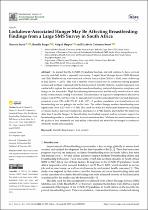| dc.contributor.author | Sayed, Nazeeia | |
| dc.contributor.author | Burger, Ronelle | |
| dc.contributor.author | Harper, Abigail | |
| dc.date.accessioned | 2022-07-11T11:35:45Z | |
| dc.date.available | 2022-07-11T11:35:45Z | |
| dc.date.issued | 2022 | |
| dc.identifier.citation | Sayed, N. et al. (2022). Lockdown-associated hunger may be affecting breastfeeding: Findings from a large sms survey in South Africa. International Journal of Environmental Research and Public Health, 19(1), 351. https://doi.org/10.3390/ijerph19010351 | en_US |
| dc.identifier.issn | 1661-7827 | |
| dc.identifier.uri | https://doi.org/10.3390/ijerph19010351 | |
| dc.identifier.uri | http://hdl.handle.net/10566/7581 | |
| dc.description.abstract | The impact that the COVID-19 pandemic has had, and will continue to have, on food
security and child health is especially concerning. A rapid, Short Message Service (SMS) Maternal
and Child Health survey was conducted in South Africa in June 2020 (n = 3140), with a follow-up
in July 2020 (n = 2287). This was a national cross-sectional survey conducted among pregnant
women and mothers registered with the MomConnect mhealth platform. Logistic regression was
conducted to explore the associations between breastfeeding, maternal depressive symptoms, and
hunger in the household. High breastfeeding initiation rates and the early introduction of other
foods or mixed milk feeding were found. The prevalence of depressive symptoms in this survey
sample was 26.95%, but there was no association between breastfeeding behaviour and depressive
symptom scores (OR = 0.89; 95% CI: 0.63, 1.27). | en_US |
| dc.language.iso | en | en_US |
| dc.publisher | MDPI | en_US |
| dc.subject | Breastfeeding | en_US |
| dc.subject | Hunger | en_US |
| dc.subject | Food security | en_US |
| dc.subject | Covid-19 | en_US |
| dc.subject | South Africa | en_US |
| dc.title | Lockdown-associated hunger may be affecting breastfeeding: Findings from a large sms survey in South Africa | en_US |
| dc.type | Article | en_US |

